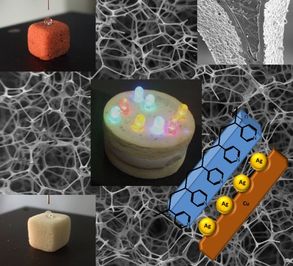News
New Paper: Large Multipurpose Exceptionally Conductive Polymer Sponges Obtained by Efficient Wet-Chemical Metallization
15.09.2015
Large Multipurpose Exceptionally Conductive Polymer Sponges Obtained by Efficient Wet-Chemical Metallization
Markus Langner, Seema Agarwal, André Baudler, Uwe Schröder and Andreas Greiner Advanced Functional Materials 2015, 25(39), 6182-6188.

Exceptionally conductive (250 S cm−1), very fast electrically heatable, thermally insulating, antimicrobial 3D polymeric sponges with very low density (≈30 mg cm−3), superhydrophobicity, and high porosity, their method of preparation, and manifold examples for applications are presented here. The electrical heatability is reversible, reaching 90 °C with 4.4 W in about 19–20 s and cooling immediately on switching off the voltage. The sponges show high contact angles >150° against water on the sponge surface as well as inside the sponge. Water droplets injected into the sponges are ejected. A facile wet-chemical method established for macroscopic melamine–formaldehyde sponges is the key for the thorough in-depth surface metallization of the sponges. The coating thickness and uniformity depend on the metallization formulation, conditions of metallization, and the type of metal used. A scanning electron microscope is used for morphology characterization. A reduced metallization rate in air is highly critical for the in-depth uniform coating of metals. The resulting metallized sponges could be highly interesting for heating as well as insulation devices in addition to oil/water separation membranes.

